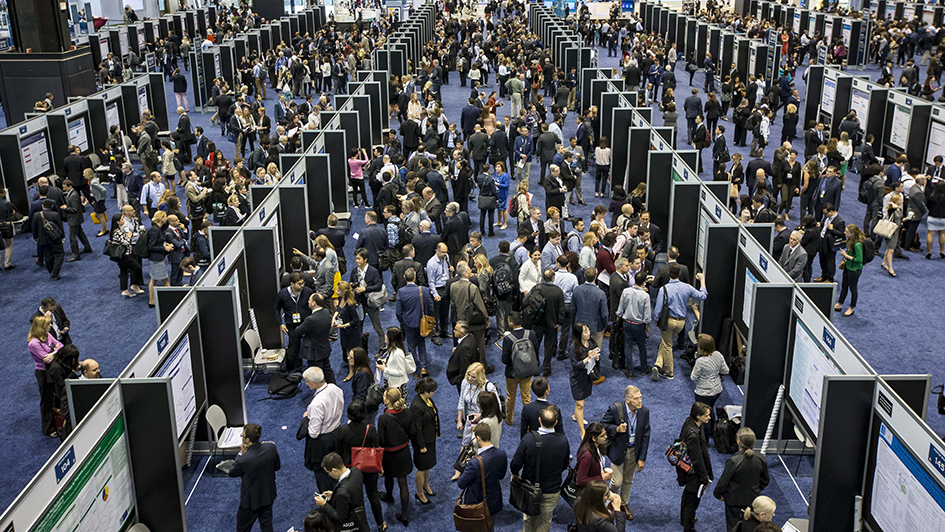
Image: Crowd of people looking at various posters at ASCO 2018 conference. Photo courtesy of ASCO/Rodney White 2018
Over the next five days, our researchers from The Institute of Cancer Research, London, will be joining over 30,000 cancer scientists and clinicians from around the world to share the latest clinical cancer research and impacting patient care at the American Society of Clinical Oncology annual meeting.
The theme for this years’ conference, which is the biggest cancer-related annual meeting in the world, is ‘Caring for Every Patient, Learning from Every Patient’.
The organisers have aimed to strike a balance between exciting new research developments – including advances in targeted therapies for pancreatic, prostate and paediatric cancers – and exploring new approaches to improving patient access to cancer care.
Turning the conversation towards the patients
The ICR has a unique insight into the discussion around patient access to potentially life-saving drugs, having recently published a report, From Patent to Patient, which found that NHS patients are waiting longer for new cancer drugs due to delays in taking them through clinical trials and getting approval for their use.
At the ICR, we’ve been talking to people with cancer and we learned – from a survey of 1,000 patients – that as many as 16 per cent have been denied a drug recommended by their doctor, or have experienced delays receiving it.
The ICR’s new 10-point Cancer Drug Manifesto calls for action on this, to speed up access to innovative cancer drugs, recommending greater flexibility from drug regulators, new models of drug pricing and greater access to clinical trials for patients.
ICR research at ASCO
With many exciting talks from world-leading oncologists, we’ll be highlighting four presentations about trials conducted by the ICR to look out for:
Additionally, Dr Alec Paschalis, in Professor Johann de Bono’s team, will be presenting on Friday 31 May at 3:09pm about how testing for faults in DNA repair genes could help pick out men with prostate cancer who could benefit from an exciting new kind of nuclear medicine targeted specifically at prostate cancer cells.
Professor Johann de Bono will also be speaking at the conference on Monday 3 June at 10:15am about his research into how a drug, which prevents DNA repair molecule ATR kinase from functioning, could be used to treat patients with advanced tumours.
These are only some of the many contributions from ICR researchers to the conference. All conference abstracts are available to read online, and here is a list of other ICR highlights to look forward to:
Saturday 1 June
- Abstract TPS5089: Professor de Bono’s research will also be displayed in a poster on an early phase study into the use of a first-in-class drug to treat patients with advanced prostate cancer who have run out of treatment options.
- Abstract 5070: This poster shows how DNA extracted from the prostate cancer patients’ blood can be used as an indicator of how well they will respond to the combination therapy of the two chemotherapy drugs, docetaxel and cabazitaxel.
- Abstract 6026: Professor Kevin Harrington has a poster about the KEYNOTE-040 study, which found that treating patients with advanced head and neck cancer with the immunotherapy pembrolizumab (after they have stopped responding to chemotherapy) could extend their lives by more than three years – proving more effective than aggressive chemotherapy as a first-line treatment for these patients.
- Abstract 3087: This phase I trial will be on display as a poster, describing how taselisib and palbociclib can be used to treat breast cancer patients with genetic changes in the PIK3CA gene, who have stopped responding to treatment.
- Poster discussion session: Professor Udai Banerji will be hosting a session to discuss three different posters (3012, 3013, 3014 and 3015) about early stage trials which involved targeting cell death and genetic changes that lead various cancer types, including glioblastoma and non-Hodgkin lymphoma.
Sunday 2 June
- Abstract 2025: A drug which controls whether cells survive checkpoints to promote tumour cell death has been tested in this early phase trial for treating patients with recurrent glioblastoma or high-grade glioma.
- Abstract 1051: Professor Nick Turner also has a poster about the PIPA trial, which uses the same drugs as in abstract 3087, taselisib and palbociclib, to treat ER-negative breast cancer patients.
On top of all the exciting research from ASCO, look out for an ICR-led study, publishing in Lancet Oncology today, about the international phase II trial which examined the ability of the drug cediranib to halt disease progression in patients with alveolar soft part sarcoma, a rare slow-growing soft tissue tumour.
We are building a new state-of-the-art drug discovery centre to create more and better drugs for cancer patients. To make our building a reality, we urgently need your philanthropic support.
Support our appeal
Keeping up to date with conference news
If you’re heading to the conference, make sure to have a look at all the ICR sessions taking place over the weekend.
Keep up to date with the exciting presentations and posters at the conference by following along on social media using the hashtag #ASCO19.
More ASCO coverage
comments powered by